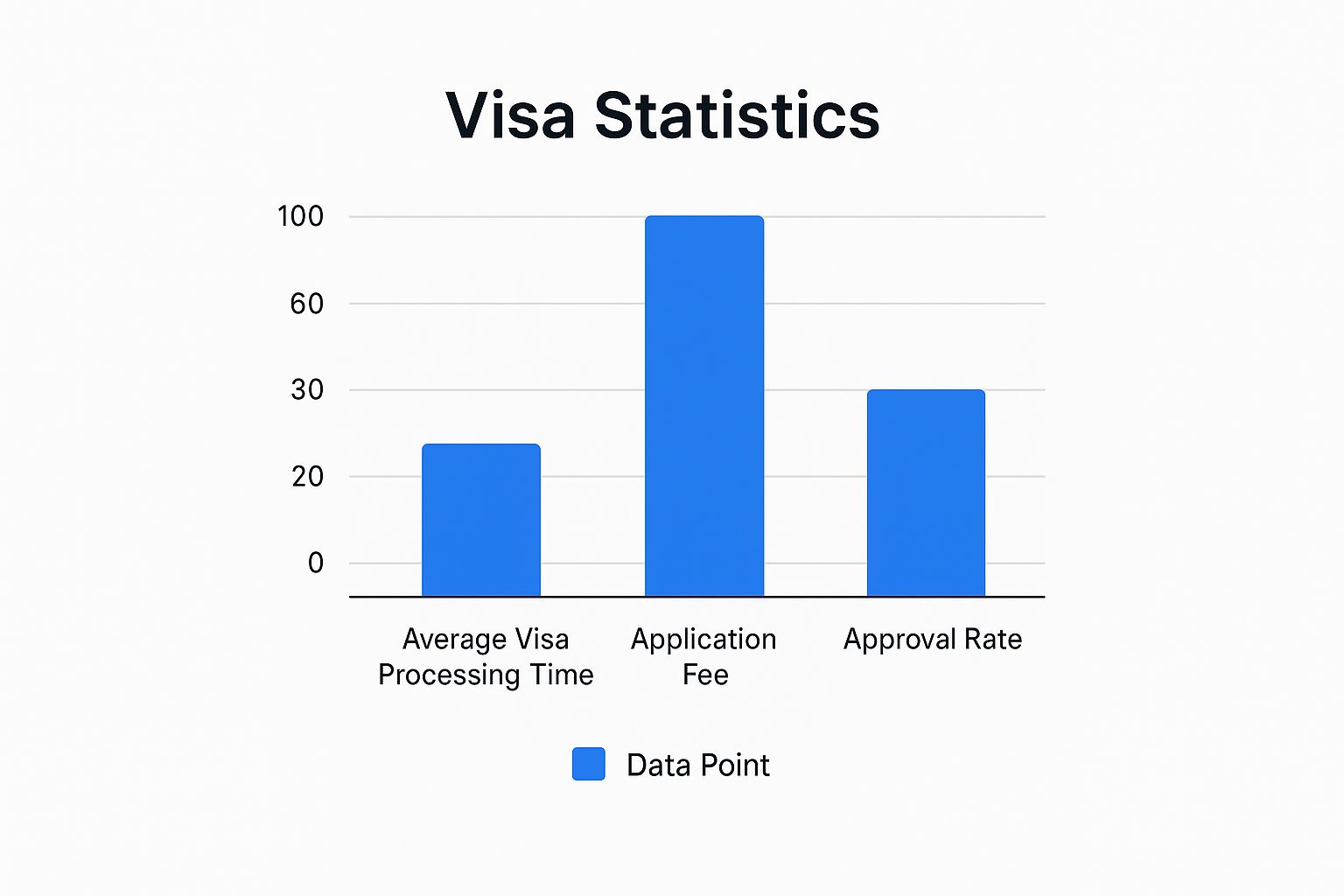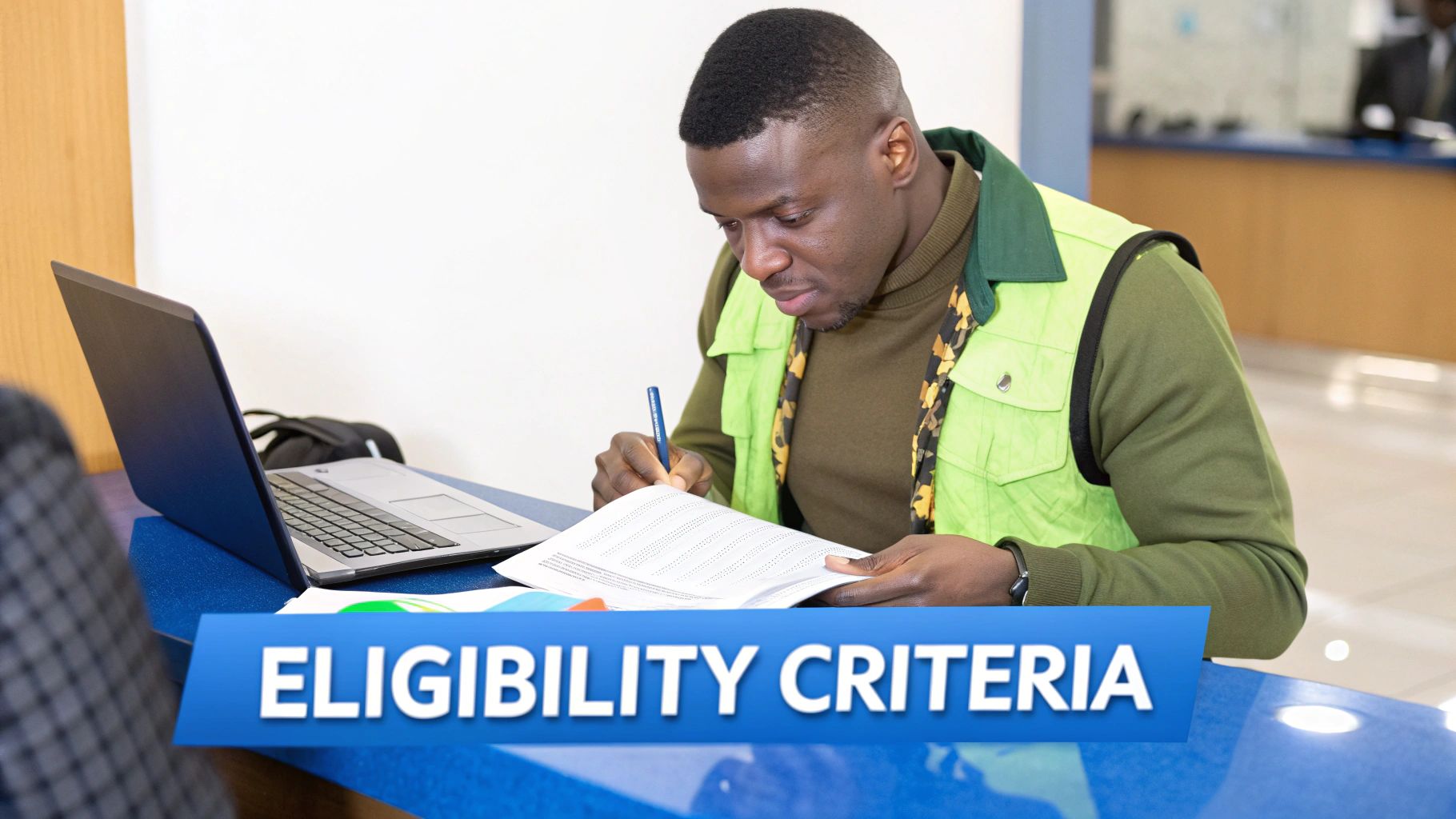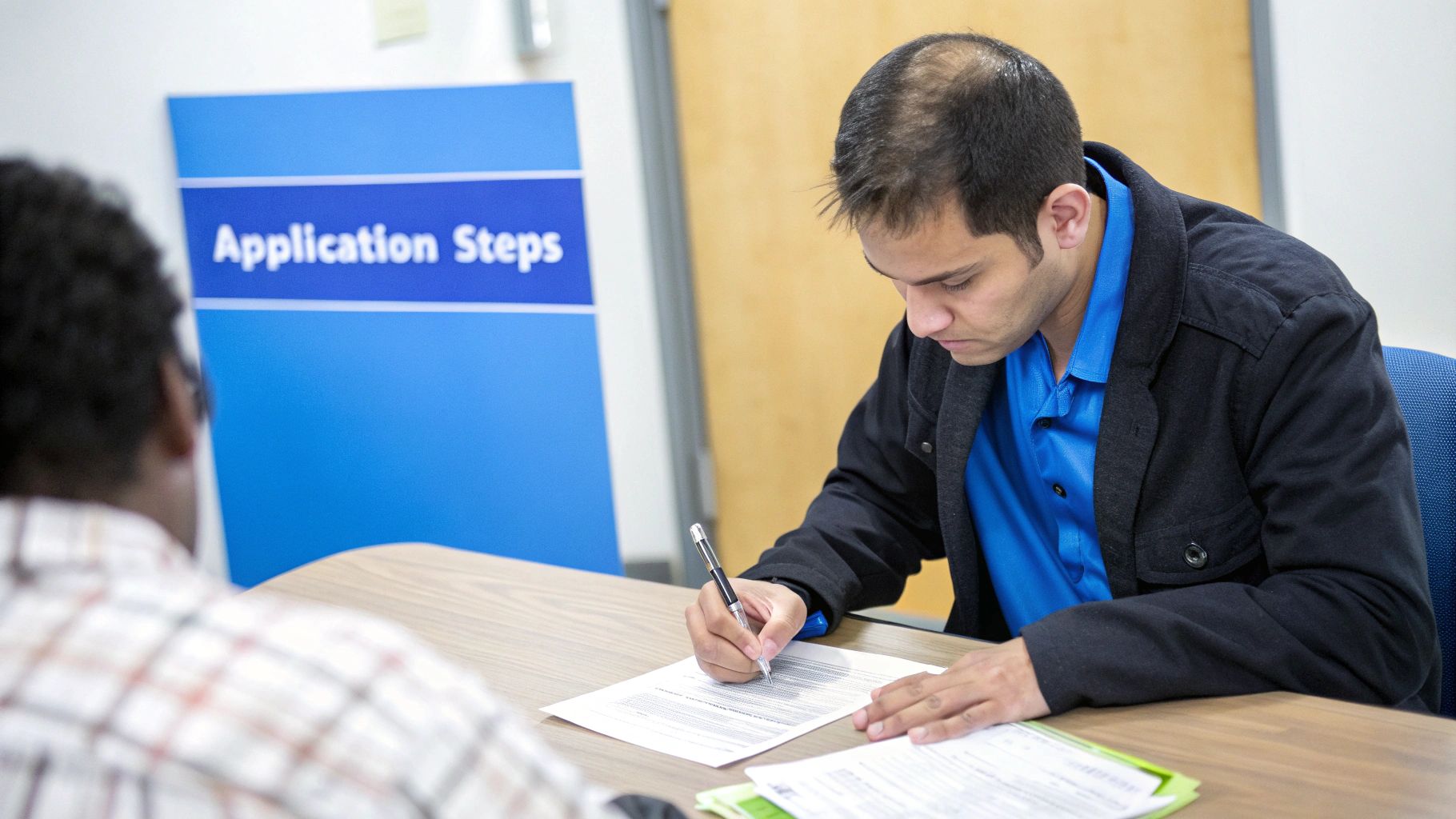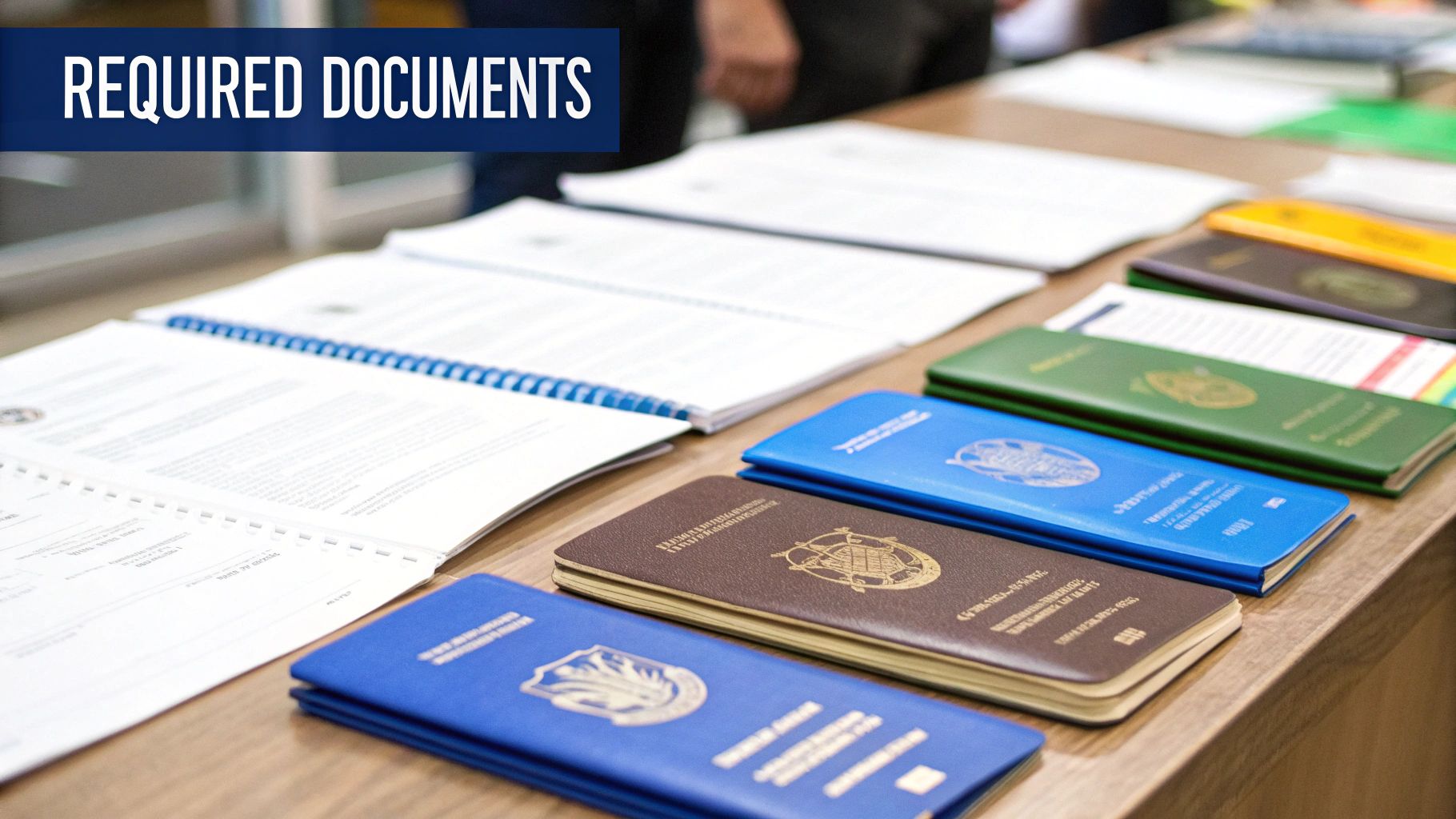Portugal Visa From Nigeria: Your Complete Application Guide

Choosing The Right Portugal Visa For Your Journey
Let's get one thing straight about getting a Portugal visa from Nigeria: one size definitely does not fit all. Picking the wrong visa category is a classic mistake that can stop your application in its tracks. Your reason for travelling—whether it's a sunny holiday, a university degree, or a new job—is the single most important factor that decides which visa you need.
Understanding the difference isn't just a technicality; it's the foundation of a solid application. Each visa type has its own rulebook, a specific checklist of documents, and different expectations from the embassy. For example, applying for a tourist visa when you’re actually planning to look for work is a major red flag for any visa officer. It’s crucial to be honest about your intentions from the start.
Tourist, Study, Or Work? Aligning Your Goals
For most short trips, the Schengen Visa (Type C) is what you’ll be looking at. This is your go-to visa if you plan to visit for tourism, see family, or attend a brief business meeting. The best part? It gives you access not just to Portugal, but to all 27 countries in the Schengen Area for up to 90 days within a 180-day period. Imagine exploring Lisbon's colourful streets one week and then flying to Rome the next—that's the freedom a Schengen visa offers.
However, if you're planning to stay longer, you'll need a National Visa (Type D). These are issued for stays beyond 90 days and are tied to a specific purpose. Here are the common ones:
- Study Visa: Perfect for Nigerians who have been accepted into a Portuguese school or university. You'll absolutely need your official acceptance letter and solid proof that you can cover your tuition and living expenses.
- Work Visa: This visa depends on a formal job offer from a company in Portugal. Your employer will usually handle some of the paperwork on their end, providing a work contract that is the centrepiece of your application.
- Digital Nomad Visa (D8): A fantastic option that’s become very popular with remote workers. If you can prove a stable remote income of at least €3,480 per month from non-Portuguese sources, you can apply to live in Portugal while continuing your job online.
Before you apply, it helps to know which visa is the right fit. To make it clearer, here’s a breakdown of the main visa types available to Nigerian applicants.
| Visa Type | Validity Period | Primary Purpose | Processing Time | Key Requirements |
|---|---|---|---|---|
| Schengen Visa (Type C) | Up to 90 days within a 180-day period | Tourism, family visits, short business trips | 15-45 days | Flight itinerary, hotel booking, proof of funds, travel insurance |
| Study Visa (Type D) | 1 year (renewable) | Enrolling in a Portuguese educational institution | 60-90 days | University acceptance letter, proof of financial capacity, accommodation proof |
| Work Visa (Type D) | Linked to employment contract | Working for a Portuguese employer | 60-90+ days | Signed employment contract, professional qualifications, police clearance |
| Digital Nomad Visa (D8) | 1 year (renewable) | Remote work for foreign clients/employers | 60-90 days | Proof of remote income (€3,480+/month), tax compliance records, accommodation |
| Golden Visa | 2 years (renewable) | Investment in Portugal | 12-18+ months | Significant financial investment (e.g., funds, company creation) |
This table shows that while Schengen visas are faster, long-stay visas like the Study or Digital Nomad options require more specific documentation tied to your long-term plans in Portugal.
This chart gives you a quick look at key metrics for a typical Portugal visa application from Nigeria.

The data shows that while the process takes time and money, the approval rate is quite good for applicants who prepare their paperwork carefully.
The Investment Pathway: The Portugal Golden Visa
For Nigerian investors and high-net-worth individuals, the Portugal Golden Visa offers a different route to European residency. This programme isn't about getting a job; it's about making a significant investment in the country's economy. Since it launched in 2012, it has granted residency to over 15,619 main applicants and their families globally. You can see the latest figures in the official Portugal Golden Visa statistics for 2025.
Choosing this path means you can bypass many of the usual requirements and get on a faster track to living in Portugal. If this sounds like it might fit your situation, it's worth exploring in more detail. Each visa tells a different story—make sure you’re applying to write the right one for your journey.
Mastering Document Preparation Without The Headaches

Let's be real—this is the make-or-break stage for most Portugal visa from Nigeria applications. Getting your documents together isn't just a box-ticking exercise; it's about telling a convincing story that makes a visa officer nod in agreement. From talking to loads of successful applicants, we've learned that how you present your documents is just as crucial as what's in them.
Think of your application file as a serious proposal. Each document is a piece of evidence backing up your main point: you're a genuine visitor who will follow all the rules. A messy, disorganised file can suggest a messy, disorganised trip, which is an immediate red flag. A neatly arranged, clearly labelled, and complete set of documents, however, shows you're a serious and responsible person.
Beyond The Basics: Telling A Story With Your Documents
Take your bank statement, for example. It’s not enough to show a large sum of money that magically appeared last week. That looks very suspicious. Visa officers want to see a statement of account from the last six months that shows a steady, consistent flow of income and savings. This paints a picture of financial stability, not just a temporary loan for the application. It tells a story of a responsible person with strong financial roots in Nigeria.
Your cover letter is your opportunity to connect all the pieces. Don’t just list the documents you’ve attached. Use it to clearly explain why you want to visit Portugal, highlight your strong ties to Nigeria (like your job, family, or property), and address any potential questions. For instance, if you had a gap in your employment history, you can briefly explain it here. A well-written cover letter is your personal handshake with the visa officer.
The Official Stamp: Navigating The Apostille Process
For some long-stay visas, you'll need to get some of your official Nigerian documents, such as birth or marriage certificates, legalised. In Nigeria, this means getting an apostille from the Ministry of Foreign Affairs in Abuja. This stamp confirms that your document is authentic and recognised internationally. Don't leave this to the last minute; it can be a slow process. Start this well ahead of time to avoid a frantic rush. Submitting a document that needs an apostille without one is a common reason for instant rejection.
To help you stay organised, we've put together a detailed checklist of the documents you'll need. Make sure you read the "Special Requirements" column carefully—this is where many applicants slip up.
Required Documents Checklist for Portugal Visa
Complete list of mandatory and optional documents with specific requirements for Nigerian applicants
| Document Type | Mandatory/Optional | Validity Period | Special Requirements | Where to Obtain |
|---|---|---|---|---|
| Visa Application Form | Mandatory | N/A | Must be fully completed, printed, and signed by the applicant. | VFS Global Website |
| Passport Photographs | Mandatory | Last 6 months | White background, 35x45mm, no glasses or head coverings (unless for religious reasons). | Professional Photo Studio |
| International Passport | Mandatory | Min. 3 months post-trip | Must have at least two blank pages and be valid for the required period. | Nigerian Immigration Service |
| Proof of Funds | Mandatory | Last 6 months | Original stamped bank statement of account showing consistent financial activity. | Your Bank |
| Travel Insurance | Mandatory | Covers entire trip | Must provide minimum coverage of €30,000 for medical emergencies and repatriation. | Reputable Insurance Provider |
| Flight Itinerary | Mandatory | N/A | A confirmed flight reservation, not a purchased ticket. | Travel Agency or Airline Website |
| Hotel Reservation | Mandatory | Covers entire trip | Confirmed accommodation booking for the duration of your stay in Portugal. | Hotel or Booking Website |
| Cover Letter | Highly Recommended | N/A | A signed letter explaining the purpose of your trip and your itinerary. | Written by you |
| Proof of Ties to Nigeria | Mandatory | Varies | Can include an employment letter, property ownership documents, marriage/birth certificates. | Employer, Land Registry, National Population Commission, etc. |
| Medical Certificate | Optional (Visa Dependent) | Last 3 months | Required for certain visa types, must be from a government-approved clinic. | Designated Hospital/Clinic |
Getting these documents in order is more than half the work done. When you present a clear, logical, and well-supported application, you make it much easier for the visa officer to give you that stamp of approval.
Conquering VFS Global Like A Seasoned Traveller

The VFS Global centre can feel like a big, confusing maze on your first visit. But once you get the hang of it, you'll see it's a pretty straightforward process. The real trick is to know what’s coming at each stage and to be over-prepared. From setting up your online profile to the biometric appointment, a bit of inside knowledge can save you a world of stress.
For Nigerians looking to get a Portugal visa from Nigeria, the journey goes through VFS Global. They are the official partner of the Portuguese Embassy in Nigeria, managing application submissions, biometric data collection, and appointments. This system helps keep things organised for everyone. You can get more details on their role directly from the official VFS Global Portugal page for Nigeria. Knowing this helps you direct your questions to the right place—VFS handles process queries, while the Embassy makes the final decision.
Navigating The VFS Portal And Booking Your Slot
First up, you’ll need to create a profile on the VFS website. A common headache here is the site timing out or being a bit glitchy. A great tip is to have all your personal information (passport number, key dates, etc.) ready in a separate note. This way, you can copy and paste everything quickly and avoid the frustration of being logged out.
Booking an appointment is where things get strategic. Slots, especially during peak travel times like summer and Christmas, are incredibly hard to come by. Here are a few tips that have helped other applicants secure a spot:
- Check late at night or very early in the morning. New appointment slots often appear outside of normal business hours. Many people have found success by logging on between 11 PM and 2 AM.
- Be flexible with your dates. If you only search for one specific day, you might miss available slots just a day or two later. If your travel plans have some wiggle room, broaden your search window.
- Get ready to be persistent. It might take a few days of checking constantly to finally book a slot. Don't let it discourage you; this is a normal part of applying for a popular destination like Portugal.
Your Biometric Appointment: What To Actually Expect
The biometric appointment itself is surprisingly quick and professional. You'll hand over your documents, and they'll take your fingerprints and a digital photo. Plan to arrive about 15 minutes before your scheduled time. Don't come any earlier, as you likely won't be allowed inside.
Here’s a simple checklist of what you need to bring:
- Your appointment confirmation letter.
- A printed copy of your completed visa application form.
- All your supporting documents, organised exactly as listed on the official checklist.
- Your international passport.
- Enough money (cash or card) to cover the visa and VFS service fees.
A piece of advice from a recent applicant: "I paid for the SMS update service, and honestly, it wasn't worth it. The online tracker is free and gives you the same information. Save your money for something else." While extra services like the VIP lounge might shorten your wait time, they have zero impact on the embassy's final decision. It's best to stick to the essentials unless comfort is a major priority for you. Once you've submitted everything, you can track your application's progress online, feeling confident that you’ve successfully handled the VFS process.
Presenting Your Case With Confidence And Authenticity

Even if you don't have a formal interview, every document you submit is part of a conversation with the consular officer. When you apply for a Portugal visa from Nigeria, approaching it with genuine honesty and smart preparation can make all the difference. The aim is to build trust and paint a clear, confident picture of your travel plans and your intention to return home.
Think of it like this: your application needs to answer the questions the officer has in their mind. Why Portugal? Why are you travelling now? What ties do you have to Nigeria that guarantee your return? A strong application answers these questions before they are even asked. Authenticity is key—a detailed, personal travel plan is always more believable than a generic two-week hotel reservation in Lisbon.
Clearly Articulating Your Travel Intentions
Your reason for travelling needs to be completely clear. Vague plans like "for tourism" can be a major red flag for visa officers. Instead, create a daily schedule that shows you've put real thought into your trip. For example, if you love history, your itinerary might mention specific museums in Lisbon or the castles you plan to visit in Sintra. If you're visiting relatives, make sure to include a sincere invitation letter from them.
Your cover letter is the perfect place to tie everything together. Use it to explain the purpose of your trip, point to the key documents that support your story, and strongly reaffirm your connections to Nigeria. Honesty is crucial here; small inconsistencies can cause big problems. It's important to understand the serious outcomes of mistakes, which you can learn more about in our guide on avoiding visa application misrepresentation.
Addressing Potential Red Flags Head-On
Do you have a gap in your work history or a previous visa denial? These don't have to be deal-breakers, but you must handle them the right way. Hiding them is the worst thing you can do. Instead, explain them briefly and positively in your cover letter.
- Employment Gap: "You will notice a six-month gap in my employment history in 2023. This was a planned period for professional certification, which has since helped advance my career."
- Previous Rejection: "I want to acknowledge a previous Schengen visa refusal from 2022, which was due to incomplete paperwork. I have been extra careful to ensure this application is complete and meets all requirements."
This direct approach shows you are honest and have fixed any past issues. Demonstrating strong ties to Nigeria is your most important job. This is more than just owning property; it's about showing you have a life to return to. For a young professional, a letter from your employer confirming your job and approved holiday leave is powerful. For a business owner, it's your company registration and tax records. For a student, it's your proof of school enrolment and family ties. When you present a genuine, well-supported case, you build the confidence needed for a successful application.
Understanding The True Cost And Timeline Reality
Let's get real about the money and time involved, because nasty surprises in either department can completely derail your travel dreams. When you're budgeting for a Portugal visa from Nigeria, the official consular fee you see advertised is only the beginning of the story. A savvy applicant knows to plan for the entire journey, not just the headline price.
From the get-go, you need to think beyond the main visa fee. You're going to face other necessary costs. There’s the VFS Global service charge for processing your application, of course, but there are also smaller, easily forgotten expenses that add up fast. For example, getting official documents like your birth certificate or academic transcripts might mean paying for an apostille. If your documents aren't in English or Portuguese, you'll have to budget for certified translations. And don't forget, securing travel insurance with at least €30,000 in coverage is mandatory.
Breaking Down The Costs And Timelines
To give you a clearer idea of what to expect, let's break down the potential costs and realistic waiting periods. These numbers are based on the actual experiences of recent applicants, not just the best-case scenarios you might see online.
To help you plan, here's a detailed look at what you can expect to pay and how long you might have to wait.
| Visa Category | Consular Fee | VFS Service Fee | Processing Time | Additional Costs |
|---|---|---|---|---|
| Schengen Visa (Short-stay) | €80 | ~₦40,000 | 20-45 Days | Travel Insurance, Document Printing, Bank Statement Fees |
| National Visa (Long-stay) | €90 | ~₦40,000 | 60-90+ Days | Document Apostille, Medical Certificate, Translations, Courier Fees |
It's important to remember that these timelines aren't set in stone. Application volumes often increase during the summer and Christmas holidays, which can cause delays. The type of visa you need also plays a big role; a simple tourist visa application will likely be processed faster than a more complex one for work or study. When you're setting your budget, it's always a good idea to have a bit extra set aside. For some solid advice on how to present your financial documents effectively, our guide on providing proof of funds for a different country offers universally useful tips.
Planning For The Unexpected
So, what if your application gets rejected? The appeals process comes with its own set of costs and waits, which you should be aware of from the start. In some situations, it might actually be smarter to fix the problems with your initial application and reapply, rather than going through a long and uncertain appeal.
Hiring an immigration consultant can be a real help, particularly if your case has some tricky elements. This is an extra expense, so you'll have to decide if the cost is worth the potential benefit for your situation. If your application is straightforward, you can likely manage it on your own and save some money. The main goal is to be ready for any outcome, create a realistic budget that includes all possible expenses, and give yourself more than enough time. This approach will save you a lot of stress along the way.
Insider Strategies That Actually Make A Difference
After going through hundreds of successful applications for a Portugal visa from Nigeria and talking to consultants who handle these files every day, some clear patterns show up. These aren't your average tips; they are real strategies that can boost your chances of approval. It’s all about showing the consular officer a level of thoughtfulness that makes your application stand out.
Think of it this way: your application is telling a story. A successful one is convincing, and every document you provide is a chapter in that story.
Crafting a Cover Letter That Works For You
Your cover letter is more than just a piece of paper; it’s your one opportunity to speak directly to the visa officer and connect all the dots for them. Instead of just saying why you want to go, build a story. For instance, if you're a tech professional applying for a tourist visa, you could write something like this:
"As a software developer at a leading firm in Lagos (please see my employment letter), I am excited to explore Portugal's growing tech scene in Lisbon and Porto. My two-week leave is from 10th to 24th October. My travel plan focuses on visiting tech hubs and historical sites, which reflects both my professional and personal interests. My bank statements show my steady salary and savings, proving I can afford this trip, and my strong professional ties in Nigeria ensure I will return on time."
This approach doesn't just state facts; it anticipates their questions about your trip's purpose, your financial situation, and your commitment to returning home. It paints you as a serious, organised applicant.
The Real Story Your Finances Tell
Consular officers have a knack for spotting "rented money" from a mile away. A huge, sudden deposit into your account right before applying is a major red flag. What they really want to see is financial responsibility over time. Your six-month bank statement should show a natural flow of income, regular expenses, and consistent savings.
Your statement should back up the life you say you lead. If your employment letter mentions a monthly salary of ₦500,000, the officer will look for those monthly payments in your account. This consistency builds a lot more trust than a large closing balance that just appeared out of nowhere. A healthy, active account history is one of the most critical things they check.
Strategic Booking and Itinerary Planning
Make sure your flight and hotel bookings line up perfectly with what you’ve written in your cover letter and daily itinerary. Don't just book a random hotel in Lisbon for two weeks and call it a day. If your plan says you'll be in Porto from day five to day seven, you must have a hotel reservation in Porto for those exact dates.
Here’s a great tip: use booking websites that offer free cancellation. This lets you put together a fully verifiable itinerary without paying a single kobo upfront. It shows you're serious and have planned meticulously. Mismatched dates are a common reason for doubt and can lead to a rejection. Getting these small details right shows you're a low-risk applicant who has thought things through, which makes your case much stronger.
Making The Most Of Your Portugal Visa Success
Congratulations! Getting that visa sticker in your passport is a massive win. But your journey isn’t over; it’s just shifting into a new, exciting gear. Securing your Portugal visa from Nigeria is one thing, but making smart use of it is how you turn a single trip into a potential gateway for future European opportunities. It’s not just about following the rules—it’s about getting the most out of what you’ve worked so hard for.
One of the best things about your Schengen visa is that it isn't just for Portugal. It’s your ticket to explore the other 26 countries within the Schengen Area. This freedom is amazing, but it comes with a few unwritten rules. For your first trip, it’s wise to follow the "first port of entry" guideline. This means you should fly into Portugal first since they issued your visa. It’s a simple way to show that your original travel plans were genuine.
Your First Trip And Beyond
Making a good impression, both at the border and during your stay, can really help with any future visa applications. When you land in Portugal, have your key documents ready, just in case an immigration officer asks.
- Keep a digital or paper copy of your hotel bookings.
- Have your return flight details easily accessible on your phone.
- Make sure your proof of travel insurance is handy.
Being prepared like this shows you’re a responsible and well-organised traveller. While you're enjoying your trip, it's a great idea to document it. Think of it as building a positive travel profile. Snap photos at famous spots, hold onto receipts from cafes or museums in different cities, and maybe even keep a small travel journal. This proof can be incredibly helpful later on if you apply for another visa, as it shows you used your previous one exactly as you said you would.
The screenshot below from Wikipedia gives you a glimpse of the incredible country you're about to see.

This flag represents a nation rich with history and culture, and you now have the privilege to explore it.
Turning Your Visa Into A Stepping Stone
If you have bigger dreams of living or working in Europe one day, this first visa is a vital stepping stone. Every time you travel and stick to the rules—like not overstaying your visit and staying out of trouble—you build credibility with immigration authorities. An applicant with a history of successful, rule-abiding trips is seen as a much lower risk for future long-stay visas, whether for study or work.
Portugal itself is famously welcoming to foreigners and is ranked 7th on the 2024 Global Peace Index. It offers a safe and friendly environment to begin your European adventures. If you’re thinking about more permanent plans down the line, maintaining a clean record now is absolutely essential. Avoid any kind of violation, no matter how small it seems, because it could have serious consequences for future applications. This success is your foundation; build on it carefully.
Planning a move abroad can feel like a lot to handle, but you don’t have to figure it all out on your own. For quick, clear answers to your immigration questions, from visa rules to travel plans, check out JapaChat. It’s an AI-powered guide created to help Nigerians like you plan their journey with confidence.

Leave a Reply